Select Language

By Howard Schneider
WASHINGTON (Reuters) -U.S. Federal Reserve Chair Jerome Powell, avoiding disputes over fiscal policy, energy, housing, Ukraine and other tangled issues, told U.S. lawmakers on Wednesday he and his colleagues would “keep our heads down” in a charged presidential election year, with interest rate cuts still likely in coming months but only if warranted by further evidence of falling inflation.
Rate cuts "really will depend on the path of the economy. Our focus is on maximum employment and price stability, and the incoming data as they affect the outlook, and those are the things we'll be looking at," Powell told the House Financial Services Committee. "We are just going to keep our heads down and do our jobs and try to deliver what the public is expecting from us."
Powell in his prepared remarks to the House panel said rate reductions will "likely be appropriate" later this year, "if the economy evolves broadly as expected" and once officials gain more confidence in inflation's steady decline.
Though nothing is guaranteed and progress on inflation "is not assured," Powell said, he regarded the economy as clear of immediate recession risks, with a low 3.7% unemployment rate and broad growth likely to continue, and an expectation that inflation will remain in decline.
"That's the economy that we're trying to achieve. We're on a good path so far to be able to get there," Powell said.
But the coming decision of when and how far to reduce the benchmark interest rate is both complex in an economy that is showing signs of continued disinflation but also unexpected strength, and consequential in the upcoming rematch between incumbent President Joe Biden, a Democrat, and Republican former President Donald Trump.
"We're in a political year," Patrick McHenry, a North Carolina Republican and the committee's chairman, said as he opened the hearing by quizzing Powell on the central bank's rate cut plans and noting that everything the Fed does would be seen through the "lens" of the November presidential vote.
Investors currently expect an initial rate reduction in June; Fed officials as of December projected three quarter-point cuts over the course of the year, and will update that outlook at a meeting in two weeks.
Though Fed officials like to say it makes little difference to the economy if they delay any decisions from one meeting to the next, Powell reiterated that the Fed does see competing risks ahead - on the one hand of failing to cut rates soon enough and doing unnecessary damage to the economy, on the other of easing credit conditions too soon and reinvigorating inflation.
For Biden, the outcome of the Fed's debates could influence whether his approval ratings and perceived management of the economy remain low, or whether he heads into the heart of the campaign with low inflation, a low unemployment rate, and falling interest rates.
Further rate hikes, at least, appear to be off the table, with Powell repeating that the current benchmark rate, held in the 5.25% to 5.5% range since July, was "likely at its peak."
"The bar for additional tightening is relatively high," said Nationwide Senior Economist Oren Klachkin, "Only a string of stronger-than-expected economic reports, mainly on the inflation and jobs front, would convince policymakers that tighter policy is warranted."
But an array of asset values have been climbing, overall financial conditions have been growing easier despite the Fed's restrictive policy stance, and some of Powell's colleagues have been talking of "exuberance" in the economy that could again rekindle price pressures.
SOLID OUTLOOK
The central bank's latest Beige Book compendium of anecdotal evidence about the economy offered an apparent upgrade to the already solid outlook, with 11 of 12 Fed regions reporting steady or increased economic activity.
For Powell and his colleagues, that has seemed to leave the bias in favor of delaying any rate cut, particularly as long as the economy remains strong.
The House session, which the Republican majority in particular used to focus on bank regulation, will be followed with a Thursday hearing before the Senate Banking committee.
For the inflation-weary constituents of lawmakers conducting this week's hearings, a high Fed policy rate means elevated interest rates for home mortgages, credit cards and small business loans, which arguably have contributed to Biden's current low approval ratings, even as that tough monetary medicine helps relieve high inflation.
Recent data has done little to clarify what may happen next. Reports bolstering the "soft-landing" narrative, such as encouraging figures on services prices on Tuesday or signs of slowing consumer spending, have been counterbalanced by others showing inflation stuck in significant ways, such as from still-rising shelter costs, or evidence of unexpected economic strength, such as January's outsized gain of more than 350,000 jobs.
But Powell remained optimistic, saying that the elements of a "soft-landing" were still taking shape even though he would not label it as such.
"We expect inflation to come down, the economy to keep growing," Powell said. "If that's the case, it will be appropriate for interest rates to come down significantly over the coming years."

By Ankur Banerjee
SINGAPORE (Reuters) - Asian stocks rose on Wednesday as traders awaited policy cues from Beijing during its week-long annual session of parliament after a prior lack of stimulus measures disappointed some investors, while gold and bitcoin eased after touching record peaks.
Traders were also hesitant to place major bets ahead of congressional testimony from Federal Reserve Chair Jerome Powell starting later on Wednesday that will be parsed to gauge if and when the U.S. central bank is ready to start cutting interest rates.
Chinese stocks were mixed a day after Beijing set a widely expected 5% growth target for 2024 at a key parliament meeting that lacked major stimulus measures.
The blue-chip CSI 300 Index was 0.08% lower while Hong Kong's benchmark Hang Seng spiked 2% higher, rebounding from Tuesday's 2.5% dive.
"The 2024 (China) economic targets still show officials are unwilling to quickly reflate the economy given concerns about excessive debt and the weakness of the yuan," said Mansoor Mohi-uddin, chief economist at the Bank of Singapore.
An economy-focused press conference at 0700 GMT on Wednesday, where representatives from People's Bank of China and other regulators may respond to media inquiries, will be scrutinised by investors looking for more policy details.
The wait-and-see approach made for a lacklustre trading session in Asia, with MSCI's broadest index of Asia-Pacific shares outside Japan initially slipping before reversing course to trade 0.46% higher.
Wall Street's three major indexes retreated more than 1% on Tuesday, with weakness in megacap growth companies such as Apple (NASDAQ:AAPL) and the chip sector weighing most on the tech-heavy Nasdaq. [.N]
E-mini futures for the S&P 500 rose 0.09%. European bourses are set for slightly higher open, with the Eurostoxx 50 futures up 0.10%, German DAX futures up 0.14% and FTSE futures up 0.05%.
A key event for investors in Britain will be the government's budget, in which Finance Minister Jeremy Hunt will do his utmost to cut taxes while avoiding the ire of bond markets.
In the U.S., data on Tuesday showed a waning expansion of the services sector, and a steeper-than-expected drop in new factory orders, with the spotlight now firmly on payrolls data due later in the week.
Benchmark 10-year U.S. Treasury yields steadied in Asian hours and were last at 4.147%, having dipped to a one-month low of 4.112% in the previous session after weak data.
Traders are scouring U.S. economic data and policymakers speeches to gauge when the Fed would start cutting rates. Markets are pricing in a 68% chance of the Fed starting its easing cycle in June, CME FedWatch tool showed. They have priced in 88 basis points of cuts this year.
That makes Powell's congressional appearances starting on Wednesday a significant event, although analysts expect the Fed chair to stick to his message.
"Of particular interest to markets is whether there is unanimity within the Fed on the continued descent in inflation, given the robust economic backdrop," said Nicholas Chia, macro strategist at Standard Chartered (OTC:SCBFF).
"Powell’s testimony may offer more colour on the debates going on within the FOMC over their take on the deceleration in price pressures, and whether they will take the plunge to cut rates before inflation is back at the 2% target."
In the currency market, the Japanese yen yen strengthened 0.08% to 149.93 per dollar, while sterling was flat on the day at $1.2704 ahead of Britain's budget announcement.
The euro last bought $1.0853 ahead of a policy decision from the European Central bank on Thursday.
The ECB is widely expected to leave interest rates at a record 4%, but the focus will be on clues about when rates might start to fall in the wake of stubborn inflation.
Data last week showed euro zone inflation dipped in February but underlying price growth remained high, adding to the case for the ECB to hold rates at record highs a bit longer before starting to ease policy towards mid-year.
Markets are pricing in 90 basis points of cuts from ECB this year.
In cryptocurrency, bitcoin was hovering around $66,000, having breached a record high of $69,202 in the previous session, fuelled by investors pouring money into U.S. spot exchange-traded crypto products.
Spot gold wobbled to $2,127.36 an ounce after touching all-time high of $2,141.59 on Tuesday. [GOL/]
U.S. crude rose 0.29% to $78.38 per barrel and Brent was at $82.27, up 0.28% on the day. [O/R]
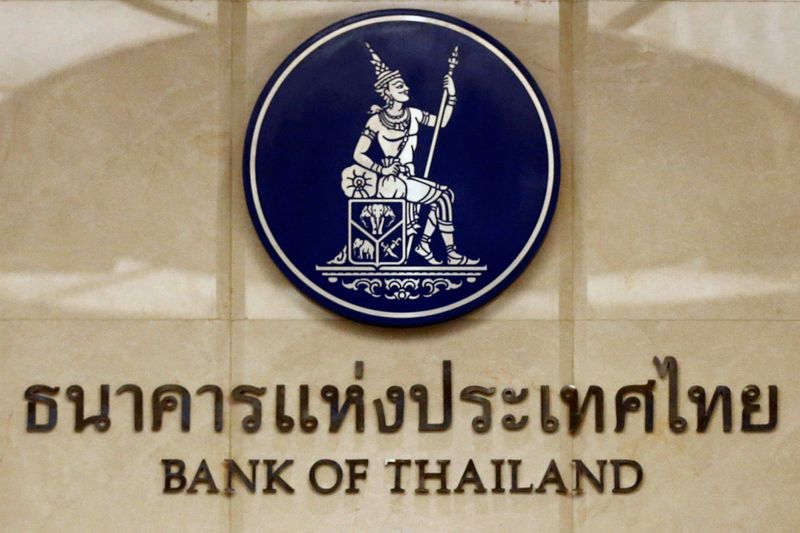
BANGKOK (Reuters) - Thailand's interest rate levels are appropriate for the current situation and are neutral, the World Bank said on Wednesday at an event in Bangkok.
The Southeast Asian country faces temporary disinflation, but no deflation, World Bank Senior Economist for Thailand Kiatipong Ariyapruchya told reporters, adding it was normal for the central bank to have different views from the government.
His comments come as Prime Minister Srettha Thavisin has for months repeatedly urged the Bank of Thailand (BOT) to cut interest rates by 25 basis points, arguing the economy was in a 'crisis' - a characterisation that the central bank rejects.
The BOT has so far resisted government pressure to reduce borrowing costs by holding rates at 2.50%, the highest in a decade. It next reviews policy on April 10.
BOT Governor Sethaput Suthiwartnarueput has called the disagreement with the government a "creative tension," contending that rate cutes would not help the economy substantially because of inherent structural problems.
Srettha, who is also finance minister, has said rate cuts were suitable because of low inflation.
Thai February consumer price index dropped for the fifth straight month, falling 0.77%.
"This is disinflation, which is a temporary effect," World Bank's Kiatipong said, adding the bank is forecasting that inflation would return to normal.
The government's $14 billion plan to giveaway 10,000 baht ($279.56) to 50 million Thais to be spent in their local communities via a digital wallet would help boost GDP by 1 percentage point, said Kiatipong, but would also increase debt 3 percentage points.
The World Bank proposes more targeted measures, he said.
($1 = 35.7700 baht)

By Summer Zhen and Samuel Shen
HONG KONG/SHANGHAI (Reuters) - Chinese money is pouring into funds invested in offshore assets at breakneck speed, butting up against outbound investment limits and complicating Beijing's efforts to revive domestic markets and stabilise the yuan.
The rush to invest offshore reflects low confidence at home and is evident in sales of funds issued under the Qualified Domestic Institutional Investor (QDII) programme, a key outbound investment channel that allows Chinese to buy overseas securities under Beijing's strict capital controls.
QDII fund units sold in January jumped 50% year-on-year to a record high while those of domestic equity mutual funds dropped 35%, data from the Asset Management Association of China shows. Assets under management for QDII funds were up 19% year-on-year.
Exchange-traded funds (ETFs) tracking Nikkei 225 and Nasdaq-listed stocks flagged price premium risks in recent weeks as buyers bid well above the value of the underlying assets to grab a share.
The outbound scramble illustrates the pressure on China's capital account and currency and the challenges in rebuilding domestic investors confidence in their home market.
Chinese stocks are wallowing near a five-year nadir while yields on the country's 30-year treasury bonds have plumbed record lows.
"We feel a pressing need from our wealthy clients to diversify asset allocation," said Le Rong, founding partner of Shanghai-based FR Harvest Asset Management, which helps clients invest via QDII. "After 20 years of high growth and high returns, the Chinese economy faces a slowdown in the foreseeable future," he said.
Managers are also struggling to keep up and are turning away prospective investors or searching for partners and other ways around limits.
The QDII scheme is capped by a quota, or limit on outbound investment, set by China's State Administration of Foreign Exchange (SAFE).
No new quotas have been granted since July, leaving the cumulative approved quota at $165.5 billion, according to official data.
Last week, ChinaAMC capped investors daily subscription into its Huaxia Global Technology Pioneer Hybrid Securities Investment Fund, which lists U.S. tech giants among its top holdings, at 2,000 yuan ($277.84). Manulife Fund Management has set a daily maximum purchase of 300 yuan for its India Opportunity Stock Investment Fund.
Another QDII product sold in China, which is putting money into a Blackrock (NYSE:BLK) UK hedge fund, has seen a fivefold surge in fundraising this year, drawing nearly $12 million against the $2.1 million it raised in 2023, according to two sources familiar with the matter but not authorised to speak publicly.
"Local investors’ demand for QDII funds has gone insane this year," said one of the sources.
The product paused new subscriptions in March, said China Resources Trust, which jointly launched the product with Blackrock. A Blackrock spokesperson did not respond to requests for comment.
Standard Chartered (OTC:SCBFF) also recently stopped its Chinese clients from making new investments in QDII products for "commercial reasons".
Zheng Peng, a QDII fund portfolio Manager at China Asset Management Co expects the trend to persist, with a gap of almost 190 basis points between 10-year U.S. and Chinese government bond yields driving current demand.
($1 = 7.1985 Chinese yuan)
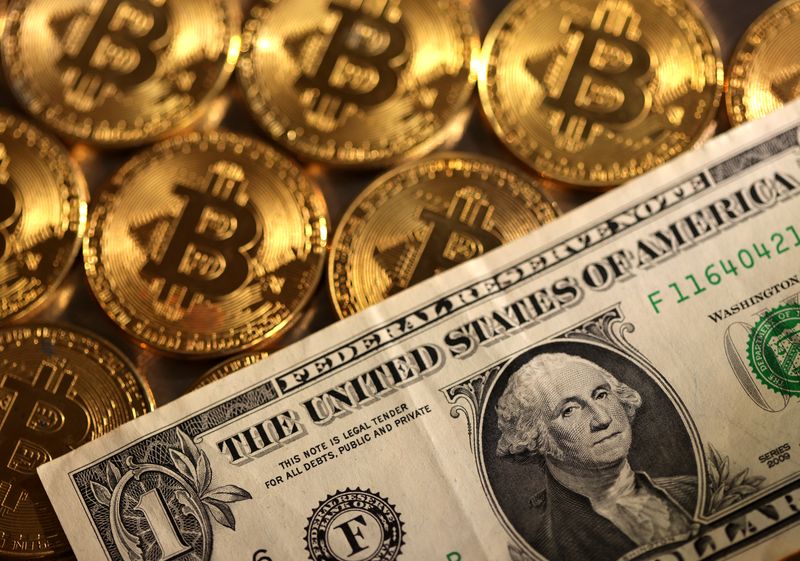
By Brigid Riley
TOKYO (Reuters) - The U.S. dollar was largely steady on Wednesday, as traders avoided making large bets ahead of congressional testimony from Federal Reserve Chair Jerome Powell, as well as the European Central Bank rate decision and U.S. jobs data later this week.
In cryptocurrencies, bitcoin was slightly up but stayed below a record high reached in a volatile overnight session.
The absence of catalysts kept the dollar in a tight range, having slipped overnight on data from that Institute for Supply Management (ISM) that showed the U.S. services industry growth slowed a bit in February.
The currency is up 2.4% for the year, buoyed by better-than-expected U.S. economic data, but it has stalled in recent sessions as investors look for further clarity on Fed policy.
The February U.S. jobs report on Friday stands as a test ahead, with the potential to rock markets. A surprise to the upside could add to the dollar's rise this year.
Traders were also waiting on Fed Chair Powell's first day of testimony before Congress on the state of the U.S. economy. Powell is expected to reinforce that the Fed will wait for more data before making any rate cuts.
"A reiteration of this message is unlikely to alter current market pricing for a June start to the FOMC’s rate cut cycle, and should therefore have limited impact on the USD," said Carol Kong, a currency strategist at the Commonwealth Bank of Australia (OTC:CMWAY).
Markets have priced in about a 60% chance of a rate cut in June, according to the CME FedWatch tool.
The dollar index, which measures the greenback's strength against a basket of six currencies, was mostly unchanged at 103.82.
Elsewhere, the ECB is widely expected to leave interest rates at a record 4% at its policy meeting on Thursday. The focus will instead be on clues about when rates might start to fall, as well as on the central bank's updated economic projections.
The euro remained firm at $1.0852.
Sterling was down 0.1% at $1.2695 ahead of the British budget on Wednesday.
The yen held around 149.92 per dollar, after the greenback overnight gave up recent gains against the Japanese currency, retreating from last week's high of 150.85.
Markets are also keeping a close eye on the world's largest cryptocurrency, bitcoin, after it surged to a record high overnight before retreating sharply.
It was last up 0.88% at $63,876, taking a breather having rallied hard since October as investors poured money into U.S. spot exchange-traded crypto products and on the prospect that global interest rates may fall.
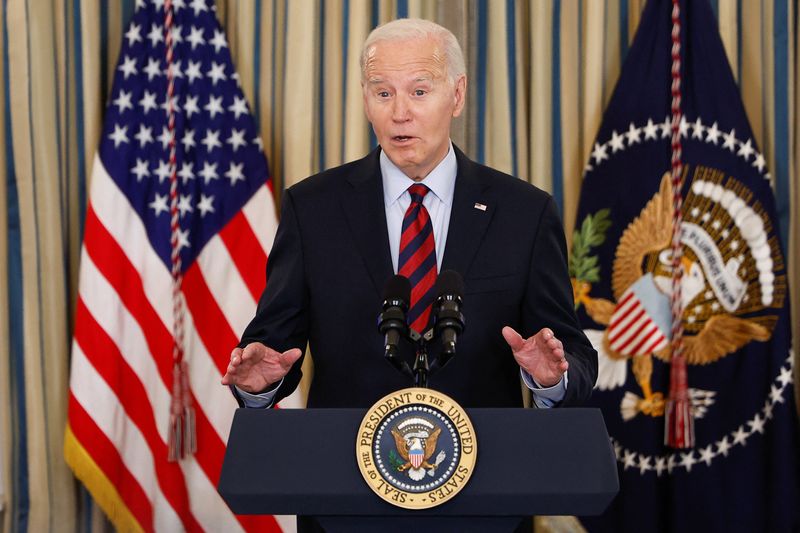
By Daniel Wiessner
(Reuters) - Major U.S. business groups on Tuesday filed the latest lawsuit challenging a Biden administration rule that would make it more difficult for companies to treat some workers as independent contractors rather than employees.
The groups including the U.S. Chamber of Commerce, the country's largest business lobby, said in a complaint filed in federal court in Beaumont, Texas, that the U.S. Department of Labor rule violated federal wage law by adopting too broad a definition of who counts as a company's employee.
Employees are entitled to the minimum wage, overtime pay and other legal protections not afforded to contractors, and studies suggest that they can cost companies up to 30% more than contract workers.
The rule, which takes effect March 11, is expected to have a broad impact on an array of industries including app-based services that rely heavily on "gig" workers to contain costs. At least four other challenges to the rule are pending, including lawsuits by freelance writers, trade groups and a trucking company that treats driver as independent contractors.
The new lawsuit also claims that the Labor Department violated a federal law governing rulemaking by agencies by failing to justify its reversal of a Trump administration rule favored by trade groups.
The business groups had sued the department in 2021 when it first attempted to repeal the Trump-era rule. A judge blocked the repeal, saying the agency had not adequately explained its decision. Tuesday's filing came as an amended complaint in that case.
The Labor Department did not immediately respond to a request for comment.
The Labor Department has said that the rule is designed to clarify the standard for determining worker classification and crack down on industries where misclassification is common, such as construction, healthcare, retail sales and security and janitorial services.
Tuesday's filing comes as Republicans in Congress are separately working to repeal the rule. Senator Bill Cassidy, a Republican from Louisiana, has said he plans to introduce a resolution under the Congressional Review Act to nix the rule.
Lawmakers would need a two-thirds majority to overcome a likely veto by Democratic President Joe Biden.

By Kentaro Sugiyama and Leika Kihara
TOKYO (Reuters) - Japan is seeing early signs of achieving a positive cycle of rising inflation and wages, Deputy Chief Cabinet Secretary Hideki Murai said on Tuesday, stressing the administration's focus on broadening pay increases beyond big companies.
The government is ramping up efforts to change Japan's long held practice in which big companies use their huge bargaining power to pressure smaller suppliers into accepting price cuts.
In guidance released in November, the government required companies to have executives take more ownership in the price-setting procedures, and clarified for the first time the chance of sanctioning firms that put undue pressure on suppliers to cut prices.
The steps underscore the focus Prime Minister Fumio Kishida is putting on boosting profits of smaller firms, which they can then use to hike wages, Murai told Reuters in an interview.
"We've made clear what companies ought and ought not to do" in price-setting negotiations, said Murai, who oversees the government's initiative to ensure the guidance is met.
"It's important to embed new business practices so that costs are appropriately passed on throughout the supply chain."
The administration has made achievement of broad-based wage hikes a top priority as rising inflation pushes up households' cost of living.
Some big firms have announced plans of bumper pay hikes to retain talent and compensate employees for rising inflation. But there is uncertainty on whether small and mid-sized firms, which employ 70% of the total number of workers in Japan, will follow suit as rising raw material costs hurt their margins.
"We need to revitalise the economy by shifting away from one that prioritises cost cuts, to one where a positive cycle of higher growth and wages kicks in," Murai said. "We're gradually seeing such (a) positive cycle fall into place."
The Bank of Japan (BOJ) is also focusing on whether wages rise sustainably, which it as set as a prerequisite for exiting ultra-loose monetary policy. Many market players expect the bank to end negative interest rates either in March or April.
Murai declined to comment on whether conditions have been met for the BOJ to exit negative interest rates, saying the decision fell under the jurisdiction of the central bank.
The BOJ has said whether or not to sustain accommodative monetary conditions, including negative rates, will depend on economic and price developments at the time, Murai said.
"We hope the BOJ continues to work closely with the government and guide monetary policy appropriately" to sustainably achieve its price target, he said.
In an effort to reflate growth and keep inflation stably at its 2% inflation target, the BOJ currently guides short-term rates at -0.1% and the 10-year government bond yield around 0%.
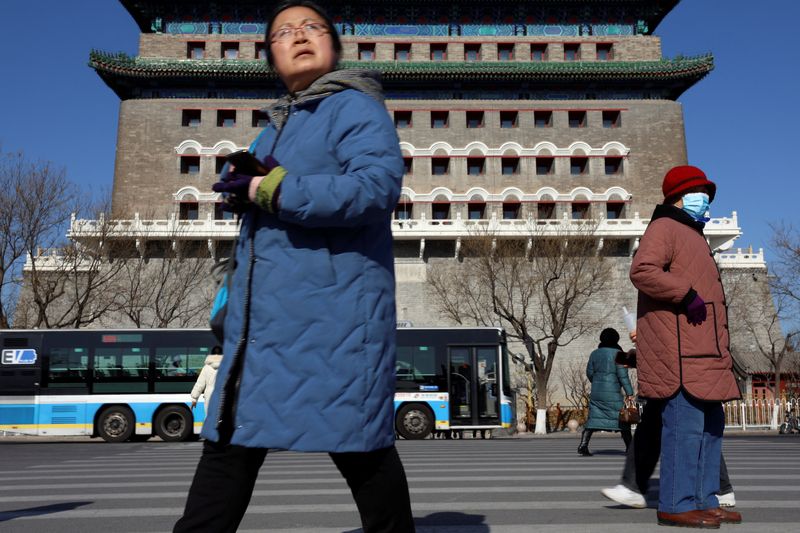
By Kevin Buckland
TOKYO (Reuters) -Most Asian stocks slid on Tuesday, led by sharp declines in Hong Kong as the start of China's week-long annual session of parliament disappointed investors with its lack of big ticket stimulus plans to prop up the struggling economy.
Equity markets in the region were already on the back foot following a retreat from record highs on Wall Street on Monday, amid signs the U.S. Federal Reserve is in no hurry to cut interest rates. U.S. stock futures also pointed lower, as did European futures.
Bitcoin continued its ascent to a fresh two-year peak of $68,828 that put it within spitting distance of an all-time high. Gold marked a record closing high of $2,114.99 on Monday and continued to hover around that level.
The Chinese government retained last year's target for economic growth of "around 5%" for this year, and announced plans to run a budget deficit of 3% of economic output, down from a revised 3.8% last year.
It also unveiled plans to issue 1 trillion yuan ($139 billion) in special ultra-long term treasury bonds, which are not included in the budget.
Mainland stocks reversed early losses with the blue-chip CSI 300 up about 0.45% by 0600 GMT, amid signs of suspected state-backed buying of some exchange-traded funds.
However, that failed to lift other markets in the region with Hong Kong's Hang Seng deepening earlier declines to 2.67%. MSCI's broadest index of Asia-Pacific shares outside Japan lost 1%.
The early announcements from China's NPC suggest "large fiscal stimulus is off the table for now," said James Kniveton, senior corporate FX dealer at Convera.
"Stability is still the overriding factor in Chinese policy making, and the announcements so far seem to conform to that philosophy."
Japan's Nikkei erased early losses in the afternoon session, but ended the day slightly down to miss out on a new record high close.
Meanwhile, alternative assets such as cryptocurrencies and bullion have been supported and equities sold following hawkish comments from Atlanta Fed President Raphael Bostic that there was no urgency to cut interest rates amid risks inflation stays above the central bank's 2% target.
Those remarks frayed nerves ahead of Fed Chair Jerome Powell's semi-annual testimony to Congress later in the week, as well as a deluge of key data on prices and jobs, culminating with Friday's non-farm payrolls report.
"There are signs of slight irrational exuberance and maybe a squeeze of long-suffering shorts in some markets," particularly bitcoin and gold, said Kyle Rodda, senior markets analyst at Capital.com.
"The moves have come despite only a minor shift in rates market pricing."
Odds for a U.S. rate reduction by the Fed's May meeting declined below 22% from 26% a day earlier, according to CME Group's (NASDAQ:CME) FedWatch Tool.
The dollar index, which measures the currency against six major peers, edged up 0.02% to 103.86. It eased 0.07% on Monday, as declines against rivals like the euro and sterling overshadowed gains against the yen.
The euro was flat at $1.0852, after advancing 0.14% on Monday, with the European Central Bank due to set policy on Thursday. Traders are convinced it will keep rates steady at the meeting, but futures imply an 88% probability that cuts will start in June.
Sterling was little changed at $1.2685, following a 0.3% rise at the start of the week, in the run-up to Wednesday's UK budget. Finance Minister Jeremy Hunt has been trying to dampenspeculation about big pre-election tax cuts.
Against the yen, the dollar was steady at 150.49, following Monday's 0.27% climb. The currency pair tends to be extremely sensitive to moves in long-term U.S. bonds, and benchmark 10-year Treasury yields bounced from 2-1/2-week lows overnight to sit at 4.21%.
Elsewhere, crude oil continued to tick lower, as demand headwinds counterbalanced a widely expected extension of voluntary output cuts through the middle of the year by the OPEC+ producer group. [O/R]
Brent futures were off 17 cents to $82.63 a barrel, while U.S. West Texas Intermediate (WTI) eased 25 cents to $78.49 a barrel.
($1 = 7.1975 yuan)
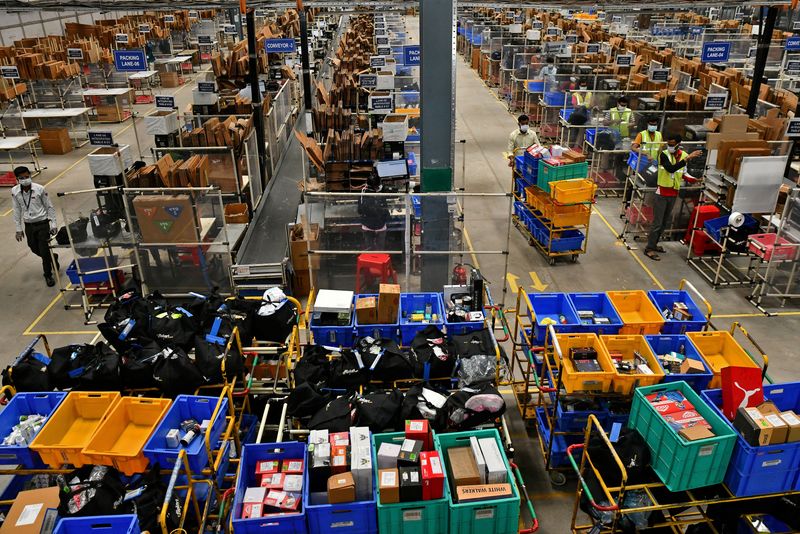
By Anant Chandak
BENGALURU (Reuters) - Activity in India's services sector continued to accelerate in February, albeit at a slightly slower pace, according to a business survey that also showed inflationary pressures were cooling.
Tuesday's survey injects a sense of optimism in the industry, the engine of economic growth and jobs, suggesting Asia's third largest economy will continue to grow at a world-beating pace this year after registering 8.4% last quarter.
The HSBC India Services Purchasing Managers' Index, compiled by S&P Global, fell to 60.6 last month from January's six-month high of 61.8 and confounding a preliminary reading for a rise to 62.0.
However, it has stayed above the 50-mark that separates growth from contraction since August 2021.
"India's services PMI suggests that the pace of expansion in the services sector eased in February from January," noted Ines Lam, economist at HSBC.
"Due to a slowdown in growth in new orders and output, services companies' outlook for future business activity, while remaining strongly positive, weakened slightly."
New business - a key gauge of demand - softened to a six month low but has been in expansionary territory for over two-and-a-half years and orders from abroad remained resilient.
However, the outlook for the coming 12 months was not as positive and business optimism was at its weakest since November. Hiring slowed and employment generation was barely in positive territory.
That said, firms got some relief from inflationary pressures with operating costs rising at the weakest pace since December, which was somewhat passed on to customers as prices charged rose at the slowest pace in two years.
India's retail inflation touched a three-month low in January and was expected to remain within the Reserve Bank of India's target range of 2%-6% over the coming months although it will be at least July before the central bank cuts borrowing costs, a recent Reuters poll found.
Despite India's manufacturing industry growing at the fastest pace in five months in February, the slower expansion in services activity brought the HSBC India Composite PMI Output Index lower to 60.6 in February from the previous month's 61.2.

By Neil Jerome Morales and Mikhail Flores
MANILA (Reuters) - Philippine annual inflation sped up for the first time in five months in February because of faster increases in food and transport costs, likely giving the central bank little reason to consider lowering interest rates.
The consumer price index (CPI) rose 3.4% in February from a year earlier, the statistics agency said on Tuesday, which was above the previous month's 2.8% and the market forecast of 3.1%, but still within the central bank's 2% to 4% target for the year.
But the central bank said inflation could overshoot its target range from the second quarter because of the impact of the El Nino weather phenomenon on farm production and as prior inflation was slower.
"The risks to the inflation outlook have receded but remain tilted toward the upside," the Bangko Sentral ng Pilipinas said in a statement.
One of the main culprits behind the February uptick was rising prices for rice. The inflation rate for the staple accelerated to 23.7% from last year, the fastest in 15 years, because of elevated rice prices in the world market and the effects of lower prior price increases.
Core inflation, which strips out volatile food and energy items in the consumer basket, eased to 3.6% versus the previous month's 3.8%.
The central bank, which last month kept its benchmark rate steady at 6.50% for a third straight meeting, said it "deems it appropriate to keep monetary policy settings unchanged in the near term." It meets next to review policy on April 4.
The central bank would likely keep rates at current levels for an extended period, ING Economist Nicholas Mapa said in a post on social media platform X.

